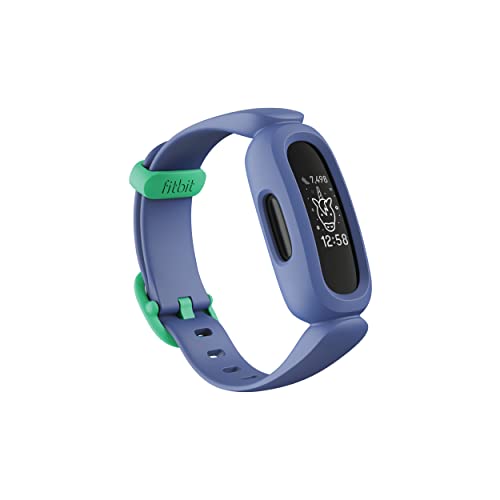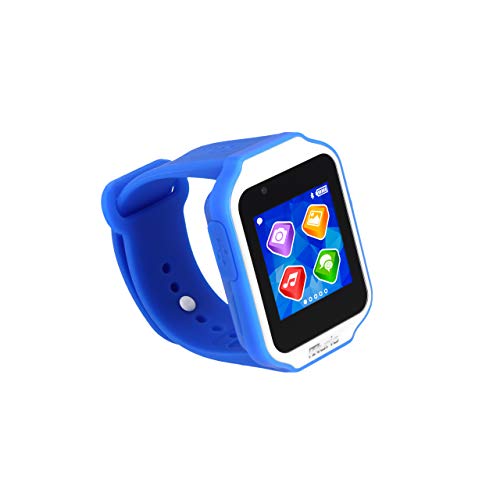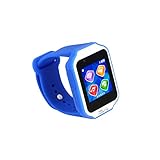5 Fitness Trackers Perfect For Teaching Children The Importance Of Good Health
Fitness tracking smartwatches are primarily marketed towards health-conscious adults hoping to improve themselves via exercise and strict physiological monitoring.
However, it’s never too early to instruct children on health either, especially as (like us big kids) they tend to be living more and more sedentary lives.
It may seem a little unnecessary to some, but treating your child to a fitness tracker can be an exciting way to get them invested in health and fitness.
They’ll have fun counting their steps and staying active, trying to beat their record. It could prevent them from forming bad habits that will potentially have a negative impact on their well-being as they grow older.
That’s why I put in the leg work, and spent the last few weeks researching the best fitness trackers for kids, and I’m happy to share my findings with you today!
Our Best Fitness Tracker For Kids Reviews
1. Fitbit Ace 3
The Fitbit Ace 3 treads the line between bulk and durability perfectly. It’s not so large as to irritate a tiny wrist or catch on things, yet the thick rubber casing is robust enough to roll with the punches.
It’s also waterproof to 50 meters, so, given the opportunity, your child can cannonball with confidence — zero hesitation!
Arriving with a lot of the same health tracking features as the full-fat Fitbit for adults, the Ace 3 is the ultimate tool for keeping tykes ticking over and staying active.
The step counter is super accurate, the sleep tracker helps form healthy bedtime habits, and virtual badges offer tons of positive reinforcement to keep your kid motivated.
Oh, and did I mention that the face displays animations that evolve throughout the day? Pretty cool, right?
I will say that it’s unfortunate that kids need a smartphone if they wish to fully monitor themselves, but, besides that petty grievance, the Ace 3 is a delight!
PROS
- Great Features – All your kid needs to stay healthy.
- User-Friendly – No challenge for kids.
- 8-Hour Battery Life – Enough for a full night’s sleep tracking.
- Virtual Rewards – Offer positive reinforcement.
CONS
- Price – It’s a lot for a 6-year-old.
2. Garmin Vivofit Jr. 3
If you were to let your young child pick out their own fitness tracker, they’d instantly gravitate towards the vivofit jr. 3, as they can be bought with various charming Disney, Marvel, and Star Wars skins.
But beyond the eye candy, these are quality trackers that in no way detract from Garmin’s spotless reputation in the fitness industry.
It features a step tracker (that, by the by, kids love), a sleep monitor to ensure children aren’t only exercising enough but resting enough too, and loads of 60-minute activity challenges for active inspiration.
Children of four years and up have no problem engaging with the interface, and they go absolutely nuts for the full-color display, but, to be honest, it is a little chunky for the lower end of the vivofit’s rated age range.
PROS
- 1-Year Battery Life – No charging necessary.
- Kid-Themed Skins – Helps to get children excited about exercise.
- Great Features – Challenges and sleep-tracking included.
- Color Display – Lovely to look at.
CONS
- Size – It’s quite chunky.
3. Fitbit Inspire 2
As well as the standard stuff like a pedometer and distance gauge, the Inspire 2 offers advanced tracking features such as caloric burn and 24/7 heart rate monitoring, letting your teen know exactly where they are in regard to their fitness goals.
Teen years can be some of the most restless of all, so the detailed sleep tracker that logs info on light, deep, and REM sleep stages is another welcome addition. A good night’s rest means they can better face the day.
It also allows teens to compete with friends on inter-tracker challenges, which helps to keep fitness fun, adds extra incentive, and encourages community-based exercise and a culture of support.
Granted, it’s a little pricey, but the sleek design won’t cramp their style, and the deep feature set will keep them from growing bored and discarding it.
PROS
- Deep Feature Set – Keeps teenagers interested.
- Sleek Design – Encourages teens to wear it.
- Inter-Tracker Challenges – Adds a social aspect to fitness.
- Waterproof – Tracks swimmer progress.
- 10-Day Battery Life – Minimal charging.
CONS
- Price – They’ll need to look after it!
4. BiggerFive Fitness Tracker
If your child is at that age where they seem to enjoy watching the world burn and breaking anything they come into contact with, you’ll need a cheap and cheerful fitness tracker like this BiggerFive offering.
The strange thing is, I found it really difficult to determine where exactly costs have been cut. It has all the staple tracker features a child would need, including a pedometer, a calorie counter, a basic sleep tracker, and a silent vibration alarm for peaceful awakenings.
Hell, it even has an alert system that reminds children to rehydrate throughout the day, something trackers 3 times the price often don’t.
It’s waterproof, which is great for the small swimming obsessives in your family, it’s durable enough to survive tiny hell raisers, and it’s nice and comfortable too.
The only downside I can see is that it’s not all that much fun to look at for younger kids.
PROS
- Great Feature Set – Just as impressive as expensive alternatives.
- Price – Won’t break the bank.
- Hydration Alerts – Hydration is so important.
- Comfortable – No chafing or excess weight.
CONS
- Design – Kind of dull to look at.
5. Kurio Glow Smartwatch
It may have a fairly basic feature set as far as fitness is concerned, but that’s not to say that the Kurio Glow Smartwatch won’t get your child moving.
Blurring the line between health devices and gaming stations, the motion-sensing Glow offers up over 20 super fun activities for getting the blood pumping and the party going.
In addition, it features a camera, a calendar, a customizable lighting system, a calculator, and can even send and receive text messages to and from other Glow watches and compatible smartphones.
All these extras encourage long-term investment in the tracker, ensuring your child gets as many health benefits out of it as possible.
PROS
- Bluetooth – Can be used to text or as a speaker.
- Camera – A nice touch.
- Price – Great value for money.
- Motion Sensor Games – Makes moving fun!
CONS
- Basic Fitness Tracking – Not as fleshed out as other trackers.
Best Fitness Tracker For Kids Buying Guide
It’s easy to pick out the best fitness trackers for adults. You simply choose the one with the most bells and whistles; job done! But it’s not so cut and dry when it comes to fitness trackers for kids.
It can be hard to determine exactly what it is that makes one product more suitable than the other.
So, to help take the edge off a decidedly confusing consumer journey, I’ve composed this brief yet informative fitness trackers for kids buyer’s guide.
Fit
Our number one concern when shopping around for a fitness tracker for our little bundle of joy (and energy) is the fit. It needs to be comfortable, or it will become too much of a burden, and they won’t want to wear it.
Even though some fitness trackers with adaptable straps are marketed towards both adults and kids, not all of them will sit snugly on a child’s wrist.
It’s always best to measure your child’s wrist before finalizing any purchases.
Size
Kids only have cute little wrists, which means fitness trackers with bulky faces look quite odd and may cause discomfort. What’s more, a child is far more likely to knock a bulky tracker on things during playtime, possibly damaging it, which brings me to my next point.
Durability
Kids may look like sweet little angels, but they’ve got destruction in their souls.
They can’t help it; it’s just part and parcel of being a child. They don’t quite have the capacity to look after delicate things, which is why a robust fitness tracker is key!
Rubber coatings, flexible straps, and reinforced faces will all help a fitness tracker to survive the brutality of our offspring.
P.S. A little waterproofing wouldn’t go amiss either.
Price Point
Next on the agenda is deciding on a price point. As we’ve already established, children are little wrecking balls, so even if a fitness tracker is super robust, it’s best not to spend too much on one.
If a child doesn’t find a way to maim or dismantle it, there’s a good chance that they’ll take off their fitness tracker at some point, forget to put it back on, and lose it.
And where the perils of our own children end, the perils of other children begin. Fitness trackers are a novelty; not many kids will have them, which will no doubt attract some unwanted attention from older kids with sticky fingers.
Simplicity
Less is definitely more when it comes to fitness trackers for young kids. It doesn’t need to be an all-singing-all-dancing mega tracker, as your child won’t understand the functionality enough to gain anything from it.
If I’m being honest, you may be best off choosing something that your child won’t engage with at all.
You’ll want to be able to set it up, pop it on your child’s wrist, and let it do its thing, leaving your child with nothing to worry about besides being active and having an absolute blast!
That said, slightly older kids these days may be even more technologically minded than the parents, in which case, go ahead and treat them to a tracker with a deeper feature-set.
Fitness Tracker Ecosystem
If you already have a smart fitness tracker, and you’re happy with it, it might be worth sticking with the same brand when selecting one for your little one, especially if the brand’s corresponding app has some sort of family account option.
That way, you’ll be able to monitor and control both your own and your child’s fitness trackers from one handy location.
Frequently Asked Questions
Got time for a brief fitness tracker for kids FAQ segment? Excellent! It won’t take a minute, and it may answer any queries you have that slipped through the cracks of my buyer’s guide.
-
Do Fitness Trackers Work For Kids?
It’s best to find one that’s specifically designed for kids, but yes, fitness trackers work for children the exact same way they work for adults.
-
What Age Is Fitbit Ace 2 For?
While Fitbit’s first foray into fitness trackers for kids was designed to be used by children upwards of 8 years old, Ace 2, the second iteration, is suitable for children as young as 6.
-
What Features Should A Kid’s Fitness Tracker Have?
I’d consider activity monitoring and sleep tracking essential features of a fitness tracker for kids. Activity monitoring is exactly what it sounds like. It records things like distance walked or run, heart rate, and calorie consumption.
Sleep tracking analyses movement and heart rate during bedtime to assess how much sleep your child is getting. The results can help you ensure your child is getting enough shut-eye, thereby improving their mood, their energy levels, and focus.
-
At What Age Should My Kid Start Using A Fitness Tracker?
While there are currently no guidelines in place that we can consult to establish what age a kid should start wearing a fitness tracker, it’s probably best to leave it until they’re at least 5 years old.
After all, until this point, you’ll be spending most of your time with your child anyway, so you’ll know how active they’ve been without any swanky wrist-tech.
Studies carried out by the World Health Organization revealed that roughly 80% of youths between the ages of 11 and 17 don’t get sufficient exercise.
So, I’d suggest introducing a fitness tracker to a child at perhaps 8 or 9 in order to educate them about health and fitness before they enter this vulnerable period.
Summing Up
That’s your lot from me, friends. I’ve included a variety of very different – yet equally awesome – trackers in my list in order to help as many parents out as possible. No matter how old your little fitness fanatic is, there should be something here that’s just right for them.
Here’s hoping that burning all this extra energy will mean they actually go to sleep (for once), giving us a nice moment of peace and quiet before the chaos begins again in the morning.
Last update on 2023-01-22 / Affiliate links / Images from Amazon Product Advertising API









